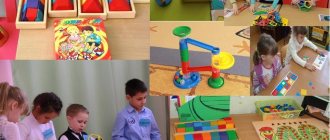The importance of adaptation of young children to the conditions of a preschool educational institution cannot be underestimated, because it is there that they first acquire full-fledged experience of collective communication. The child should get used to new acquaintances, a different routine, unusual impressions, and so on. This requires certain conditions, and you will learn what they are from the article.
Adaptation of young children to preschool conditions
The one-year-old toddler has a hard time parting with his family. He is very weak and vulnerable, so adaptation to the nursery group is difficult; against the backdrop of a stressful state, the baby begins to get sick more often. His behavior changes radically - he either strives even more for his close people, or moves away from them, constantly cries and is capricious.
In such cases, if the child is phlegmatic, this character trait will manifest itself even more strongly; he will be inhibited, slow, and outwardly indifferent.
Cholerics, on the contrary, are characterized by increased excitability and restlessness.
Each of the manifestations negatively affects the baby’s behavior, appetite and sleep.
In addition, at an early age he has not developed stable resistance to infectious diseases, which means that the likelihood of infection with pathogenic microflora from other children increases.
How quickly a child adapts to the conditions of a preschool institution depends not only on his personal characteristics. This is affected by:
- at what age was the baby sent to the nursery - after a year he is more inquisitive, he can be interested in games;
- the body's resistance to disease;
- sociability - how sociable and friendly he is;
- level of development and training;
- formed and meaningful attitude towards gaming activities;
It is important whether the child is accustomed to a daily routine.
Reasons for difficult adaptation to preschool conditions
There are several aspects that provoke childhood stress. The first reason: separation from the mother. Typically, preschoolers are inextricably linked with their mother or father, and cannot imagine themselves without them. The new environment and the absence of a loved one seriously burdens the child, who has lost the opportunity to behave as he used to at home. It is difficult for him to understand and accept a new form of behavior, and this causes discomfort and suffering. Fear gives rise to stress, creating a vicious circle. The child begins to doubt that his mother loves him, since she left him alone in unusual conditions.
Unfavorable adaptation of young children to preschool conditions provokes nervous breakdowns or illnesses. During the severe stage of adaptation, the process usually drags on for a long period. In some cases, the child never adapts to an unusual group. Children with severe adaptation, which can be predicted in the clinic at an early age, are not recommended to be enrolled in kindergarten at the age of 3.
It is believed that boys aged 3-5 years are more vulnerable than girls in terms of adaptation. At this age, they are more attached to their parents, reacting more painfully to separation from them. Consider the 3-year crisis, which overlaps with the adaptation period. The baby begins to feel like an individual for the first time, demonstrating this to others. Some parents ignore these changes in their child, causing even more stress.
At the age of three, a child feels an urgent need for a parent. His weakened psyche should be protected. Sometimes the burden of adaptation in the garden turns out to be prohibitively heavy during this period.
How children behave during adaptation to nurseries
The baby’s character will manifest itself as soon as he begins to attend kindergarten, and new feelings and emotions will emerge that are unusual for him at home. The adaptation period in kindergarten requires a lot of physical and mental energy, which will affect children's behavior. Observing a child who has just started attending a child care facility, they create a characteristic portrait of him.
The pursuit of knowledge
At first, he does not show interest in “other people’s” toys and peers, he looks closely and studies the environment. Gradually, adapting, he masters the territory, begins to be interested in toys, and answers questions from adults.
Skills learned at home
In a strange environment, the child gets lost, forgets to ask to go to the toilet, and is afraid to pick up a spoon. If his hands get dirty, he doesn’t know where to wash them. Adults should initially observe his behavior and help in everything. Having gotten used to people and surroundings, the baby will remember what he was taught at home and will do everything on his own.
Emotional condition
Unknown territory, unfamiliar people, other people's toys - all this can become a reason for a child's aggressive state, especially if he has an emotional character. During the first few days, he considers himself abandoned, is afraid that his mother will not come for him, withdraws into himself, and does not make contact.
In such situations, you need to be patient, distract the child, play with him, read children's books.
Peer relationships
A child at home does not yet understand the rules of group play; he begins to play not with the children, but simply next to them. Joint games will begin much later, when contacts with peers become familiar to him.
Before this period, the child’s contact is determined by his communication with teachers.
Movement
The baby's mobility depends on his character. If he is a fidget at home, then this will soon manifest itself in kindergarten. He will watch closely for a few days, and then his temperament will take over.
Appetite and daytime sleep
Not every child at home begins to eat and sleep well in kindergarten from the first days. He does not understand the appearance of unfamiliar food and the fact that his mother does not feed him. During sleep, he often wakes up or does not sleep at all, looking around the room.
This condition goes away as the baby gets used to the team.
Speech
From new impressions, a child can forget even those words that he knew. He doesn’t know how to answer questions from adults and speaks incomprehensible words to his peers. Don't worry, everything will be back to normal. The baby will not only remember all the familiar words, he will soon know many new ones.
Health status
During habituation, the health of children requires special attention. Stress can make a child so weak that he or she needs medical attention. This may not be an ordinary disease, but the body’s reaction to changes in life. This kind of psychological defense manifests itself when the child does not want to attend kindergarten in order to stay at home.
In such cases, medication treatment will not bring results; such a child requires a special approach and psychological help.
Degrees of adaptation to preschool educational institutions
Let us consider the degree of adaptation of young children to the conditions of a preschool educational institution.
Lightweight
It is typical for a group of children who attend the institution without any special worries, with desire. The adaptation period is usually limited to 3-4 weeks. Such a baby practically does not cause any trouble. The changes in behavior that occur are short-term and almost imperceptible.
Characteristic behavior:
- The baby enters the group without excitement and looks around with curiosity.
- When an unfamiliar adult addresses him, the child looks into his eyes. Can initiate contact himself and ask for help.
- Able to keep himself occupied, mood cheerful or calm, emotions easily recognizable.
- The child adheres to the designated norms of behavior, demonstrates an adequate reaction to approval or comments, and adjusts behavior according to the situation.
- He is kind to children and willingly plays with them.
Average
The degree is typical for children without nervous disorders. Once in a new environment, they begin to get sick more often. There is an “exchange” of various infections. Some experience frequent acute respiratory infections and other problems. With this type of adaptation, the doctor can reduce the child’s morbidity level. By prescribing corrective measures in a timely manner, the physician will prevent the development of diseases and the degree of adaptation will approach mild.
Characteristic behavior:
- The baby makes contact through bodily sensations or observation of the actions of the teacher that are attractive to him.
- The first tension subsides, contact occurs on the initiative of the preschooler.
- Receives comments and encouragement adequately, but may violate the rules established in the group (social experimentation).
Approximate adaptation time: about a month. During this period, diseases may occur that occur without obvious complications.
Heavy
The progress of the stage is difficult. Change of environment is difficult for children. Response: nervous breakdowns, frequent colds.
Characteristic behavior:
- Contact with the baby is established through the parents, or it closes even with them.
- The baby's attention is scattered: he may show interest in toys, but he does not stay for long.
- Doesn't start play activities, looks worried.
- He is indifferent to the teacher’s comments and praise, or gets scared, seeking protection from his parents.
A child experiencing severe adaptation may require help from a pediatrician or specialist.
Next, we will consider the reasons that provoke such behavior.
Periods
In the early age group, periods of habituation occur in three stages.
Light – (10–14 days):
- the first stage – within 10 days the child’s behavior and sleep improve;
- the child begins to eat well by the beginning of 2 weeks;
- is interested in what is happening around him, and morning crying is possible;
- treats children either indifferently or interestedly;
- follows the instructions of teachers;
- There are no signs of neurosis.
Medium – (4 weeks):
- the child may not sleep well for a whole month;
- prolonged lack of appetite;
- mood is changeable, whims alternate with a calm state;
- when parting with loved ones - screams, excited state;
- treats children and teachers selectively;
- Nervous disorders are observed - sweating, fatigue or increased vigor.
Severe – (8-9 weeks):
- there is a decreased appetite, sometimes vomiting;
- the child is indifferent, does not take part in games, cries for a long time;
- avoids communication with children, shows aggression;
- stool and urinary incontinence;
- short-term interest in games;
- there is a lag in speech development.
During a difficult period of adaptation, the baby’s health deteriorates and neurological disorders begin.
Stress factors
Even a healthy child who is prepared for change has certain difficulties in adapting to a preschool educational institution; this happens if he experiences negative feelings.
Anxiety
The baby is having a hard time with the change in his usual home environment. Unfamiliar space and strangers cause him anxiety. New rules of life, routine and absence of relatives can provoke tears and hysterics.
First impression
The first day of visiting the nursery group of a children's institution determines with what desire the child will go there next time. The first visit is the most important.
Lack of skills
If a child has not been taught basic personal hygiene and self-care skills, this will complicate his situation in kindergarten. The baby will quickly become the object of ridicule of other children and will feel awkward.
Psychological unpreparedness
For the baby, the mother is the center of the universe, he is strongly attached to her, and parting with her will cause an internal protest, his reactions will be violent and unpredictable.
Personal rejection of the team
Unusual behavior of strangers stresses the child. He may not accept a new team into his world for a long time, and may not play with children until he gets used to it.
Fear
Situations that arise in the garden cause fear of the unknown in children; this condition complicates adaptation, makes children touchy and whiny.
Overabundance of impressions
New impressions cause a storm of emotions in the child, he experiences a lot of worries, gets overtired, is capricious and refuses to go to kindergarten.
Optimal age and basic skills
Studying the ability of children to get used to a new place, many psychologists argue that the best age for the first visit is:
- girls – 3 years;
- boys - 4 years old.
These children develop an interest in their peers, they are more relaxed about change, and it is easier to do preparatory work with them.
Unfortunately, often a one-year-old baby or a little older is sent to a nursery. Of course, such a toddler can get used to someone else’s aunt, who will take the place of his mother for some time, but he will not accept this. He will develop passive resistance, which will subsequently manifest itself in nervous disorders and affect the intellectual and emotional development of the child.
If there is a need for children to be in a nursery at such an early age, it is necessary to instill in them basic skills:
- hold spoon and cup;
- Wash your hands yourself;
- asks to go to the toilet;
- eat carefully, do not throw food around.
Adaptation of a child accustomed to independence will be much easier.
How to prepare a child for a nursery group
When accustoming a child to kindergarten, preparatory work should begin several months before the future event:
- tell interesting stories about the kindergarten;
- if a peer you know also goes to kindergarten, say so;
- explain how many new friends and new games there are.
In order for the adaptation to the nursery to be successful, such stories must be reinforced with “reinforcing games”, then the children will form the following picture:
- show your baby’s favorite toys how they go to kindergarten together and joyfully;
- how they eat with other children;
- how they play happily and then relax;
- how to talk to the teacher.
If you unobtrusively play out with your children every day all the situations that await them in the nursery, then the adjustment will be easy and painless.
Important! During games, there is no need to focus the baby’s attention on the fact that he will be in the nursery without his mother.
Phases of the adaptation process: acute, subacute, compensation
There are several phases of adaptation of young children to the conditions of a preschool educational institution.
Acute phase
Characterized by various fluctuations in mental status and somatic state. Consequences are observed in the form of periodic respiratory diseases, sleep disturbances, loss of weight and appetite, and regression in speech development. Symptoms last for about a month.
Subacute phase
The child's behavior is quite adequate. All negative manifestations are reduced, appearing only in certain parameters. This occurs against the background of a low rate of development (especially mental) in comparison with average age norms. Symptoms may last 3-5 months.
Compensation phase
The phase is characterized by an increased rate of development, thanks to which the child overcomes the previously mentioned developmental delay by the end of the school year.
Problems related to adaptation remain in the theoretical plane, limited to short recommendations for parents before the child enters kindergarten - to bring the home daily routine closer to the routine of a kindergarten or other institution.
At the same time, the adaptation period is very important: it requires radical actions by adults. The solution to the issue lies with preschool teachers. They have to organize the baby’s life so that he can painlessly and adequately adapt to new conditions.
Psychologist's advice
When a child’s usual living conditions change, his stereotypes collapse. So that he gets used to it faster and the new requirements are not burdensome for him, he must be prepared in advance and listen to the advice of a psychologist.
Meet the staff
Before the baby’s first arrival at the nursery group, parents must come to the kindergarten themselves and meet the director, teacher and psychologist. It is necessary to establish a trusting relationship with them and tell them about your child’s character and what characteristics he or she has. Collaborative interaction will minimize stress for babies as they adjust to the nursery.
Time control
Until the child gets used to it, take him to the garden for at least a week for only 2-3 hours and spend this time next to him.
In the first days, so that the baby does not witness emotional meetings and partings of children with their parents, it is necessary to bring him later than usual and pick him up earlier.
Favorite toy
After asking permission from the teacher, bring games for young children and a favorite toy. In an unfamiliar environment, it will have a calming effect on the baby.
Calm environment
Arriving home, the child should feel loved, he should be given more attention, he should not be scolded for his whims, create comfortable conditions and reduce any burden.
You should always remember that if your baby feels supported, he will easily overcome any difficulties.
Baby development
You should always encourage your child to act independently, then he will feel confident. Children of primary preschool age strive to be significant, this feeling must be supported in them.
Games with a child during the adaptation period
Play is the main means of relaxation for a preschooler. Through the game, trusting relationships are built.
What are the advantages of playing for a child in comparison with other means of relaxation:
- The child gets the opportunity to feel his strength and abilities.
- He doesn't have to feel helpless.
- He learns about the world around him, learns self-expression, and rises in his own eyes.
- Learns to communicate.
- Learns to manage your own feelings.
- Experiences a wide range of emotions.
- Various games with sand and water provide an excellent relaxing effect.
- Negative emotions are inhibited by monotonous hand movements, so pay attention to games such as collecting large construction parts, stringing balls on a cord, and the like.
Preschool educational institutions often use such effective games as “My Favorite Kindergarten,” which demonstrate all the advantages of the institution. Usually in the center of the room there is a small stand with a photo of the institution. Petals with corresponding notes are glued next to him. These inscriptions (or drawings) should be made by the child, listing all the good things that exist in the kindergarten and school.
The game “Sunshine” is also often used, which allows you to receive “psychological strokes” from others, which are urgently needed for a child to feel his importance and value in the eyes of others. The game is played in a friendly atmosphere and in a good mood. Ideally, the participants in the game will be the baby’s parents, whose encouragement and appreciation is especially important. Through games and fairy tales, you can show your child all the advantages of a preschool educational institution, and this opportunity must be used at every convenient opportunity.









